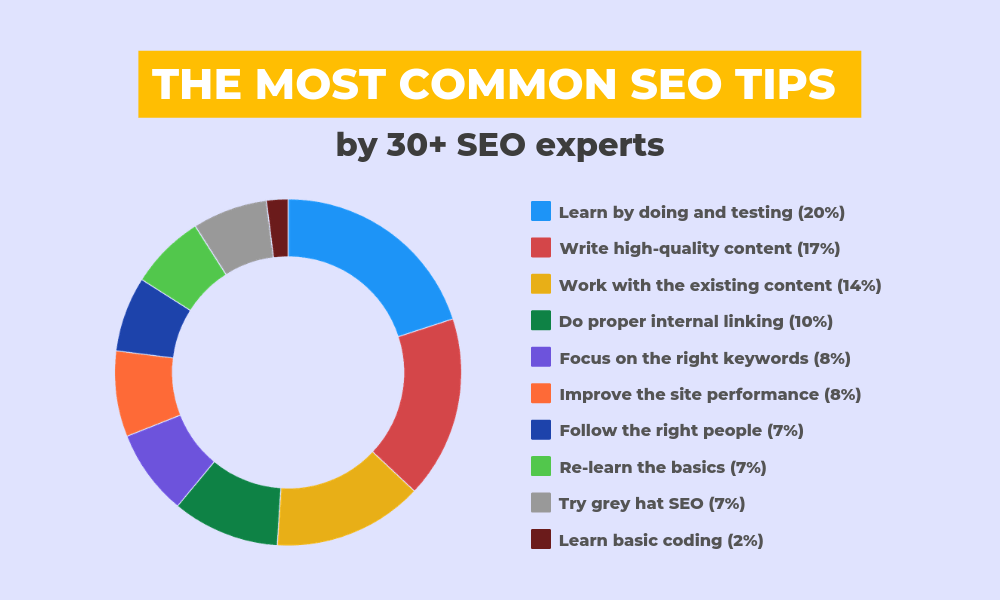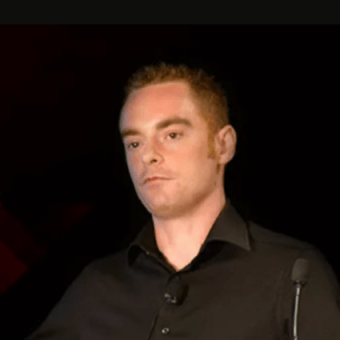Learning from people who work in the field on a daily basis and know the theory, as well as the practice, is always worth it. That’s why we decided to contact more than 30 SEO experts and ask them about their best SEO tips for beginners.
Here are the questions we asked:
1. If you should give only one piece of advice to an SEO beginner, what would it be?
2. What SEO tip, truth or technique have you learned or re-discovered recently? What was your last SEO aha moment?
The roundup was originally focused on the search engine optimization tips for beginners, but we found out that many of the answers may be interesting for advanced users too.
Although all the answers are unique, there are certain recurring topics and advice recommended by several experts. Here’s a visual overview of the tips by categories:
Let’s dive into the specific answers.
30+ tips from experts in the SEO industry
1. Focus on keywords and backlinks
I think there are a few things that you need to keep an eye or at least which you mustn’t neglect:
- Do keyword research. If you skip the keyword research stage then you’re going to end up with content pages that most likely won’t attract a sufficient amount of traffic. The golden rule is to find keywords that have the lowest competition and enough search volume.
- Allocate internal links. That’s what will help you rank higher without spending 10x hours on acquiring external links. I highly recommend cross-linking your content as well as adding the most important pages in your site’s navigation.
- Build links. The more links you have, the better. But build only quality links that will help your site not only rank better in Google but also establish your brand as trustworthy, improve its Surround Sound SEO, and boost its search share within the industry.
2. Get .edu links via coupons
I recently spoke at an event in Russia where a speaker shared how to build .edu links. I’d never heard of this strategy before but it might be relevant to any industry where someone is selling something (not only physical). So here’s how this strategy would work for an e-commerce site:
- You create a special coupon code for students
- After this, you need to use this operator to find .edu sites that have a page with student discounts “site:.edu student discounts”
- The last step is to contact those sites and tell them that you’re providing a special discount for their students. Also, I’d recommend personalizing your promo codes by adding a college name to each code
1. Learn and test
Learn and gather as much knowledge from the community as you can – there are SEO tips and tricks being shared daily that will help you in your practice – but don’t be afraid to test your own ideas and theories to see what works.
Even if that just comes down to testing particular content angles – such as satire – that you don’t really see many people talking about but you noticed that one random blog did it and picked up a ton of links.
There are many fundamentals in SEO and lots of “hacks” that might sidetrack you. I think it’s healthy to focus on the former but experiment with the latter as well.
2. Playing with the content dates
For many years I’ve been focused on the topic of freshness and how people “game” the dates in search results to their favor so something appears to be updated, even if it hasn’t been. Lots of big sites fake this, and it’s interesting to see how they go about it.
There’s no guarantee that a fresher date associated with your article will improve rankings, but I have done multiple personal case studies when I’ve seen them help. I actually think you’ll find this tweet pretty interesting. I found that only one page on my site of a certain style wasn’t ranking, and that’s probably because Google thought it was written 12 years ago (!).
Knowing the “hacks” in this case – like knowing how to make Google see a fresher date – is why I mentioned in answer one you should always look to go beyond the fundamentals.
So this wasn’t a new technique for me, but I’m re-learning it all the time.
1. Don’t get caught in the “infinite learning” loop
The best piece of advice to an SEO beginner would be: “Pick a few keywords and try to rank for them.”
I see that a lot of people get caught in the “infinite learning” loop and try to find that “new hot SEO strategy” that will help them outrank their competitors.
While in fact, the basic principles of SEO could not be more straightforward:
- Pick a keyword/topic that has a nice search traffic potential
- Create a page that would address that topic in a way that would satisfy potential searchers
- Get other websites to link to that page.
That’s it!
But once you try to actually do it, you’ll find a lot of little things that you’ll need to learn and master before you’ll get your pages to the top of Google.
2. Don’t rely on the search volume too much
My last “aha moment” was when I realized that the search volume of a single keyword isn’t really indicative of the total search traffic that you will get if you rank for it.
Think about it, when we do keyword research we look at search volumes of individual keywords, but when a page ranks at the top of Google, it doesn’t rank just for one single keyword – it will additionally rank for a ton of variations.
So these days I don’t rely on the search volume of keywords too much, I always study the top-ranking pages for my desired keywords and look at how much search traffic these pages are getting in total (from all the keywords that they rank for).
1. Learn by doing and find a mentor
As a beginner in SEO, it’s easy to get bogged down by all the advice floating around online. You end up spending hours and hours reading, listening, and watching everything there is to know about SEO, instead of actually doing it.
I found myself in the same boat about 6 years ago when I got into SEO. It wasn’t until I bought a domain, set up a simple WordPress site, and start implementing that I began to quickly build my skillset.
Long story short, one of the best SEO tips I can give to a beginner is to set up a sandbox site and start applying as they learn to figure out for themselves what works and what doesn’t.
Another thing I strongly recommend is finding someone who has had a lot of success in SEO and asking them to be a mentor. This is something else that really helped me build confidence, and stay excited about what I was doing. Having an expert sound bound is invaluable when you are starting out.
2. Work with existing assets
Always go back to the fundamentals. I’ve been able to generate some great results for clients recently just by going back and working on the “foundational” elements – internal linking, on-page etc.
On top of that, don’t jump straight into creating new content or building new links, always work with and leverage the assets you have on hand for the fastest gains.
One simple strategy is identifying all the existing content with decent rankings that with a simple relaunch could jump up several spots and generate an immediate uptick in traffic. I cover my process for this in great detail in this organic traffic guide.
1. Don’t be afraid to make mistakes
The world of SEO is so vast and ever-changing! You can complete all the courses you can get your hands on (or afford) and still feel completely daunted. My best advice to any beginner would be to get some basic SEO knowledge then get stuck in.
The best way to learn SEO is on the job, so be practical and hands-on from the off. Go one step at a time and don’t be afraid to make mistakes, as they say…
Your last mistake is your best teacher!
Which is lucky for me because I made loads…and learned from them.
2. Do not underestimate internal linking
I have recently rediscovered the power of internal link building. This is the only type of link building where you have complete control. I’m not sure about aha it was more of a duh moment.
Internal link building is where a link you place on your domain takes you to another page on the same domain. These links will help Google to discover new content when you publish it, rank the pages that have links pointing to them and they help you generate more income.
Some SEO techniques go in and out of fashion but internal link building should always be on your list of priorities.
1. Invest in quality web services
Invest in your website without hesitation, once you’ve found reliable and trustworthy services and providers. From hosting to UX, design and copy, don’t skimp!
The highest-ranking sites of the future are fast, clean, user-friendly, and full of useful, valuable web copy. An investment today in a good site can reap huge dividends in the long run.
2. Long tail keywords are the way to go
Mobile voice search (Siri) and smart devices (Google Home, Alexa) in our homes are changing the way our audience searches on Google. This is a huge factor to consider when researching keywords in tools like KWFinder or SEMrush (my favorite tools).
Longer-tail keywords and even an entire question (sometimes 5-8 words!) are our new keyword phrases to work with. If you don’t find data on a long-tail keyword, search it in Google. If you see anything in the results, there is data and there are people searching for it. Don’t just stop at a “low search volume” in an SEO tool.
You might reap more benefits by going after a keyword string without data that will be used by more and more people in the days to come. I can’t recommend this enough.
Match your keywords and SEO usage to the way people are searching today and in the future!
1. Stick to the basics
Don’t focus on all the small stuff. Instead, stick to the basics that will get you results.
- A website that treats the visitor with respect and helps them (also fast and good on mobile)
- Top notch content that is designed to really address the reader’s question/search (aim for better than the competition)
- Well researched keywords – not just the most traffic or most obvious keyword for your website/industry
2. It’s not only about links
It’s not all about links anymore. Instead, Google is focused on helping the reader/user. So, you better be too. That means upping your game on your website in every respect.
And not just focusing on fast to produce content, and then links links links. It just does not work so well anymore, and will work even less in the future.
1. Understand your audience
Become obsessed with your target audience. The more you understand your customers and audience, the easier it is to find the topics most relevant to them and understand the language they use when searching for products/solutions related to your industry.
From there, you can build an evergreen content strategy that solves their problems and answers their questions. The end result is highly targeted organic traffic that is more likely to convert.
2. The power of grouped content
While you can definitely get results by creating content on a variety of topics, I’ve found that you achieve quicker results by being more strategic and publishing content based on a specific theme all around the same time.
For example, an SEO company might dedicate one month to producing content strictly about keyword research. It’s something we’ve started implementing at Copper and we’re seeing good results.
1. Do not underestimate the basics
Completely learn the basics! While altering a title tag is an easy way to get started in SEO, so many folks never cover their education. Unfortunately, figuring out how to learn the basics can be hard.
Currently, I think DistilledU is the industry’s best at the moment. But even a copy of The Art of SEO would be a good place to start.
2. Provide complete solutions
I was reading the Ahrefs blog recently and was impressed with everything about the blog itself. They’ve seen something like 100% traffic growth in the past year, and you can see why. Every blog post solves a problem for the reader and suggests the next step. The next step typically includes Ahrefs software. It’s a complete solution. The reader never has to click back to Google to perform another search.
1. Take an experimental approach
SEO needs to be approached scientifically. There’s no manual you can read to master it. There’s no degree you can study for. You can only apply different stimuli to websites, and track the results, hoping to glean an answer from the output.
Track anything and everything. Get creative with your experiments. And pay close attention to the sites on page 1, because the answer to ranking is already in plain sight.
2. Answer the queries precisely
Google is getting extremely good at figuring out if your content is answering the search query correctly. Think about what “questions” the users are searching for with their queries and focus hard on answering them very precisely in your content.
For example, if someone searches for “best way to lose weight”, answer them distinctly and concisely, such as “In our opinion, the best way to lose weight is to manage calorie intake.” This will make it very easy for the natural language processing algorithm (NLP) to determine your answer for the query, and increase your chances to catch the featured snippet.
Of course, the rest of your article will back up your statement, but make sure to answer it very distinctly as well.
1. Try SEO first-hand
Start your own website so you can freely test and do your own SEO experiments. The best way to really learn what works and what doesn’t is to try them first-hand. There are a ton of resources out there that you can learn from, but I believe that experience (and having your own data) would be far more valuable in this particular discipline.
2. “If you build it, they’ll come”
I’ve been spending a lot more time in doing technical audits these days, but one thing that I’ve been really fascinated in rediscovering recently is on how to semi-automate link building by strategically optimizing highly-informative and highly-linkable pages on a website to consistently earn mentions/links from other authority websites.
There’s a bit of truth in “if you build it, they’ll come”.
1. Don’t be afraid of gray hat
Work on your own sites and test everything. There is a lot of great SEO content out there these days, but there are also a lot of unsubstantiated claims that are provided as facts. Test everything for yourself on your own sites to determine what actually works.
Don’t be afraid to test out grey hat tactics as well, they can really deepen your understanding of how search rankings work. Learning by doing is the best way to become competent at SEO.
2. Get more value from your current content
The fundamentals of SEO haven’t really changed much in the past few years. If you create good content, build links, and provide a great experience to searchers you will put yourself in a good position for long-term success.
Also, conversion rate optimization (CRO) is a great complementary skill to have along with SEO – getting more value from your current traffic can often be much more effective than trying to increase traffic volume.
1. Follow the right people
In the beginning, it’s always hard as there is so much information from a number of different people, I would say be careful who you listen to.
Follow a handful of experts rather than a whole bunch of them as you can get confused very quickly, so focusing on someone who does the job well with a credible proven track record is key.
I spent the first few years of my SEO career following the wrong people and wasted a lot of time and effort in doing so.
2. CTR manipulation works well
When I was in Chiang Mai for the SEO conference they have over there, there were a few good moments where I got new bits of advice. There is a lot of knowledge bombs when you surround yourself with the right folk, and that event has literally hundreds of successful people dropping SEO tips all the time.
There are too many to mention them all, but one that stood out was CTR manipulation. With CTR being a ranking factor, how to manipulate that to get better rankings worked very well.
1. Read the case studies
Cultivate your SEO-intuition from the beginning. Experiment and measure. You need to understand how SEO works based on your experience and skills.
It’s better to read not just blog posts, but case studies to learn the necessary knowledge. It’s desirable that the example was in your niche. The strategy and tactics will be significantly different.
2. Dig into Analytics
My aha moment happened when I wondered what users do when they read my blog post, especially which links they visit the most. I decided to find out the details and added a Google Analytics code to track outbound links to the page.
I found out that my readers were particularly interested in an outbound link pointing to a site with a certain topic. This topic was only mentioned in my article, but not covered in detail. So I wrote some new content on this topic and added it to my original article.
After a couple of months, the article started to rank for a couple of new keywords that ended up being the major source of organic traffic to the article.
Therefore, it’s very important to conduct your experiments!
1. Get to know ALL the aspects of SEO
If I was going to give just one piece of advice to a brand new SEO, I would tell them to familiarize themselves with all of the aspects of SEO.
This includes technical SEO, keyword research and content creation, outreach and link acquisition, PR, and then to pay attention to how an SEO’s work interfaces with the different teams within a company and ultimately how it affects the bottom line of business.
I unfortunately see way too many “SEOs” these days who are myopically focused on one thing and don’t understand, nor do they try to understand, the other parts of SEO and that leads them to prioritizing things that are not the highest leverage SEO activity to undertake. This is a disservice to clients!
2. The power of internal linking
Over the last year, I’ve increasingly become re-amazed at how powerful internal linking changes can be to drive more (or even 1 if there were 0 before) internal links to pages that are relatively orphaned on your site.
I expanded the number of pages on my site about a year and a half ago, and when we’ve made internal linking changes to index as many of them as possible we’ve seen great lifts in rankings.
1. Follow industry news
My advice to beginners would be the same as it is to the experts; never stop learning. Search (and the technology surrounding it) never stops changing and it’s doing so rapidly. Agencies and professionals that are doing SEO the same way they were 6 months ago are already at a disadvantage.
Plug yourself into resources like Google’s Webmaster Blog, the Twitter feeds of notable Google employees like John Mueller, follow industry leading publications like Search Engine Land, Search Engine Journal, Moz, and others.
Never stop checking the pulse of the industry and learning from the people and businesses that are involved in it.
2. Fewer, in-depth articles
Fairly recently, my team and I discovered that producing mountains of content was not doing us any good. Yes, it’s important to keep producing fresh content on a regular basis but generating dozens of blog posts that do not cover a topic in-depth and lack strong promotion are ultimately wasting time.
It’s a far better approach to produce fewer, much more in-depth articles and promote them aggressively using outreach, social syndication, link building, and email. This strategy has helped position us as an authority in the SEO industry and generate more traffic to our site.
1. Start a website and go step by step…
In terms of SEO, I’d recommend that you start a website – either for your business or a passion project. The point is to test out various strategies and create a proof of concept.
Take the time to learn about on-page SEO best practices, then dig into link building strategies, and take some time to understand how technical website aspects can also impact your SEO. As you level up in each area, run experiments on your website to see how your search rankings are impacted.
Make sure to employ the use of SEO auditing tools (like SE Ranking), as well as keyword ranking tools (like Ahrefs), to get a good idea of your success and what causes it. Also, install/configure Google Analytics and Google Search Console for additional insights.
2. Find low-hanging fruit in Search Console
One of the most interesting and compelling recent SEO aha moments I’ve had was learning about and implementing Brian Dean’s (Backlinko) Google Search Console hack.
A client asked me to help incorporate it on his website and now I’m anxious to try it out for my websites, too! The hack involves combing through Google Search Console data to determine which keywords you’re coming up for in search but not ranking for — then adding those keywords into your content. Simple, right?
1. Experiment!
Never stop experimenting. The value of experimentation outweighs knowledge that has never been applied. This is not to discredit all the resources a person can use to increase their knowledge in SEO. However, application is always better than memorization.
The SEO landscape is always changing and common strategies will always be left behind by constant algorithm updates and changes. This is why experimentation is the key to getting the first spot in Google SERPs. It allows you to know what works and what doesn’t while enabling you to improve your craft.
2. Content is (still) the king
Every SEO specialist knows that the word count is a vital part of content because the longer it is, the more information you can incorporate inside the blog post – increasing the post’s value to users and Google. In turn, Google ranks your post higher in the SERPs and increases the chances of it ranking for the top spot.
I realized it when we ran an experiment that involved increasing our monthly blog post’s word count from 1000 words to a little bit over 1500 for a particular keyword that lost its spot in the first page. After a certain amount of time of tracking the keyword rankings, we’ve noticed that it was slowly improving.
Right now, the keyword has regained its spot in the first page. However, we’re still running the experiment and waiting for better results. This instance just reinforces the notion that “Content is King”.
1. Learn some basic coding
In 2019 and beyond, every SEO has to start gaining some level of familiarity around coding. Even Google has recently started recommending more companies focus on technical SEO and that means HTTPS, APIs, Schema, Pagespeed, Mobile Friendly… all of which really require some level of coding experience to truly understand, direct, and implement.
Even if you are not the implementer, you need to be able to understand when things don’t work and how to make them work.
2. Find content that works and make it better
Google, and other search engines, do not want all your content. In fact, they probably want about 5% to 10% of what we are giving them.
If you were to check your analytics, you would likely see that less than 10% of your content or products, are responsible for about 100% of your traffic, sales, conversions. Even if you have an e-commerce site, you are likely to see that your highest traffic and conversion pages are the category pages and not the individual products.
Focus on select, high-quality content, that assists a user through their education, conversion or buying process.
1. Adapt to the changes
Be flexible and adaptable. I’m cheating with this answer because I suggest that a person that’s new to a field like SEO should be willing to adapt to a changing landscape so that’ll apply to many areas.
SEO moves fast, and since a Google algorithm update can make traffic grow or nose dive, an SEO beginner should be ready to go with the flow and be eager to learn and test.
On a secondary level, an SEO beginner can make money in several ways. The options can be overwhelming once you develop a core set of skills. That said, you can adapt your skills of SEO to other areas.
For example, if you start with affiliate sites, you may discover that you prefer to help small, local businesses. So you can shift from one business model to another (affiliate marketing to local SEO), using your general SEO skills.
2. Keyword Golden Ratio
The Keyword Golden Ratio is the best way to find ultra long tail keywords that are under-served on the internet. The Keyword Golden Ratio is a keyword research concept I developed after combining ideas from some very smart people. The idea is simple, but I made the formula accessible by making it simple and nearly foolproof.
It’s a data-driven way to find keywords that you can rank for in the top 25 results in Google, usually within hours after the page is indexed.
The ratio is this:
The number of Google results that have the keyword phrase in the title divided by the local monthly search volume, where the LMS is less than 250.
If the KGR is less than 0.25, then you should rank in the top 100 when your page is indexed.
You should still rank in the top 250 when the KGR is between 0.25 and 1. And it should be pretty fast.
It works for any industry or niche, and I get emails every week about people seeing success with the KGR.
1. Attend SEO conferences
SEO is complex. Reducing it to just one piece of advice is challenging. If it were just this one SEO tip for beginners I will say attend as many industry conferences as possible and learn from speakers’ expertise.
Picking and choosing between long established and up-and-coming online marketing events isn’t easy either. Speaker line-up is a key criterion. Next to how prolific speakers are in terms of sharing with the community.
Some conferences such as SMX and BrightonSEO are safe bets. However, there are so many events at any given point in time. For a comprehensive overview, I recommend checking out Online Marketing Events.
If I may give a second piece of advice to SEO beginners, that would be read as much as you can. Google Webmaster Central Blog and Search Engine Land are among my personal favorite sources to keep up to date.
2. Site performance is almost everything
It’s neither recent nor surprising, yet truth to be confirmed and reaffirmed on a regular basis: site performance is almost everything and even the best-optimized website will fail in search unless crawl budget is managed well.
On the first part, all that needs to be said is that all other factors roughly equal Google always favors the faster website. Site performance is to be considered a business critical top priority.
It also has a huge impact on crawl budget allocation and thereby on how much of the website can be crawled and how frequently. Which in turn is essential for success in Google Search and for conversion.
That ties in nicely into your first question, too. SEO beginners are well advised to learn from site performance and technical SEO sessions delivered by expert speakers at international events.
1. Don’t believe all the SEO tips you read
My main piece of advice would be to critique everything. If you read an article of a blog post explaining the advantages of X over Y, actively seek out the counter argument for Y over X – regardless of who authored the piece and where it was published.
Whilst there is best practice, SEO is about the application of knowledge and expertise, and this is were most black hat/quick win techniques fall down as they can’t often be scaled to larger clients/larger clients won’t benefit from those techniques.
Just because something works for client A, it won’t necessarily work with client B or C, and this is where the application of knowledge, and knowing as many sides to an argument gives you the ability to be flexible and control discussions with various stakeholders. This makes you scalable and adaptable to multiple scenarios and challenges.
By being critical of everything, you can benefit your client(s) by learning how to apply SEO techniques to their business needs and tech stack and bring benefit in the long run and build a long-term relationship with the client.
2. The importance of SEO business case
Explaining the business case of SEO, in my opinion, has become more prominent once again in recent months, especially when speaking to large and enterprise level businesses.
There’s been a shift in the market over the past 12-months with more organizations taking SEO roles in-house, and the relationship with traditional full-service agencies changing.
The importance of being able to communicate the importance of SEO to a lot of non-technical stakeholders and being effectively able to show the added value of having an expert in the room is going to continue to be a trend in 2019 as the world faces a number of external uncertainties (US administration, Brexit, unrest in the EU), decision making processes on where to spend budget will be affected.
1. Write about what you love
If you’re working on a side project or looking at joining a new company, I highly recommend focusing on a topic or a vertical you LOVE. There’s too much mediocre content on the Internet now.
There’s plenty of people out there that find SEO opportunities in search volume and go after a niche exclusively because it’s a good business opportunity – but they actually aren’t interested in the topic.
I know too many people that started stuff like an “eczema cream” website, or a “colored yarn sewing kit” website, exclusively because of the search volume opportunity, but not because they actually loved those topics. Surprise surprise: their content sucks and they hate their life!
2. Optimize the crawl path
Crawl path optimization – take a look at google search console crawl data more, along with tools like Screaming Frog, Ahrefs Site Audit or Botify to look at how bots are crawling your site and XML sitemaps. The bigger your site is, the more impactful this work is!
1. Get to know our audience via Analytics
If I could only give one SEO tip, it would be to make sure you have Google Analytics (or another analytics tool) installed on your site.
With on-site user experience so much more critical than it used to be for SEO, it’s important that you know what users are doing on your site. Not only can you gain insight into your users interacting with your site, but Google Analytics will tell you how they are getting there. For example, through your SEO efforts.
2. Don’t neglect your existing content
Making sure to do content audits more frequently would probably be the SEO tip that you might consider my last aha moment.
All too often, we look at creating new content when some of the biggest impacts can come from deleting poor performing content, merging content, and updating content. Depending on the size of the site, a content audit can produce some great SEO results very quickly.
1. Focus on quality content
My best advice would be to start creating awesome content. There are hundreds of ranking factors in Google’s algorithm and most SEO beginners head towards backlinks as their first step. But, that’s a problem because people are unlikely to link to a low-quality, SEO-poor website.
You need solid content to prove your expertise, build your authority, and give other publishers a reason to link to you. Do that by following Moz’s 10x framework and promoting your content like crazy. Make sure it gives a good user experience, has fast loading times, and is optimized for SEO. The backlinks will come naturally!
2. Show your expertise
Google released an algorithm update (referred to as the “medic” update), and their guidelines had a huge focus on “E-A-T” content (which stands for Expertise, Authoritativeness, Trustworthiness).
A great workaround for meeting that criteria, without investing in new content, is to update forgotten pages on your website–including author bio, about, contact and homepages. Give them a refresh with new, keyword-optimized content and you’ll soon be seen as more of an expert than a site that doesn’t.
1. Get your hands dirty
It’s very hard to pick just one thing – but if this is advice and not a skill I’d say that it’s important to do your own testing and research. There’s plenty of people publishing findings online and they can certainly be a useful starter – but nothing beats getting your hands dirty and running test yourself.
You may find something unusual you can discuss with the wider community (which is kind of a second piece of advice I’ve squeezed in there) which can also help further your understanding of the topic in question.
2. Experiment with internal links
Internal linking – not something I’ve learned or really re-learned, but it’s something that continues to surprise me. It can be so powerful if done right – especially if you have an established and trusted site.
Adding links to a page with few can see it rocket upwards for targeted phrases – so it’s often one of those killer tactics…both low friction and high impact. Linked back to point 1 – testing is key here, there’s never an exact way to do this and every site is different.
I’ve worked with a client where 5 internal links had the desired effect, and another where 10k seemed to do the trick 😉
1. Try some online courses
Do you remember the periodic table from primary school? The first and kind of immortal infographic. So what does it mean for you as someone entering the exciting world of SEO?
Try to look at the SEO Periodic Table. This is pretty much one of the first slides when I am presenting to people who never heard (or heard very little) about SEO. Search Engine Land did an amazing job.
When you start digesting information from SEO Periodic Table you will become more and more curious. Then you can go to YouTube or Udemy where you can see lots of free and paid courses (but be picky, because some of them are better than others), and finally Lynda.com where you can pay for the subscription and receive access to a huge amount of video courses. Hope that helps 🙂
2. Redirect the subdomains
I have several aha moments every night sitting in my kitchen where there is 7 empty chairs and me on the 8th (I choose kitchen because like to be close to the fridge). It’s 4:30 am and I discover something, and then another thing, and another…
I’ve done lots of experiments recently. I discovered, for example, that bringing subdomains back to the main domain with 1:1 301 redirections (e.g. blog.example.com to example.com/blog/) may give a tremendous boost to organic traffic.
We are not talking about a sum of traffic from the subdomain(s) and the main domain. We are talking about incredible synergy where traffic may grow exponentially. One of the reasons is that there is a huge aggregation of backlinks for the old website.
1. Start with a lean website
My #1 piece of advice to any beginner is to make your website lean, responsive, and helpful. Lean, meaning not cluttered from a design and UX perspective, and loads fast. Less is more these days, stick to a basic theme and colors.
Responsive meaning it works across all devices. And helpful in that it actually helps your target user do what you are trying to do. If it’s a local electrician, make it easy to find the phone number, address and reviews. Once you are confident those tasks at hand are attended to, you can start plugging away at on-page and backlinks.
2. Make your sites for people, not robots
One universal truth that Google has been saying probably since the beginning is: make your sites for people, not robots.
Far too many people try to “do SEO” for Googlebot and end up with a penalty, crawl errors or some other unintended consequence. I’ll be honest, in the past 5 years or so my techniques have remained the same for the most part.
I can’t even remember my latest aha moment, but I’m constantly reminded of these universal truths on a daily basis.
1. Learn, test, learn…
Make sure you read as many different sources as you can, and when things contradict each other, always be testing.
SEO does take time to learn especially as you have to wait a few months to see the results of your work (if you ever do see results), so it makes sense to keep testing and learning.
2. Google is better at recognizing the intent
I feel the truth that is most important right now is how Google is fundamentally changing in one direction, and everybody is looking in the other direction.
Essentially, the summer updates seem to have been about how Google is much better at understanding the intent behind searches now, and is also able to test different results based on different potential intents.
Meanwhile, everyone else thinks it was about E-A-T, when it really wasn’t. There’s a good opportunity here to get ahead of the curve while others are slow to catch up.
1. Be critical about everything
Be critical about everything you read and everything people say. Ask other SEOs to back up their SEO tips and claims with data and sources, or at the very least explain why they think something is true or false and what thought process they went through.
There’s a massive amount of information on SEO out there, but it’s hard to filter out the bad stuff.
2. Google algo focused on search intent
The fact that several of the Google updates we’ve seen since August 1st are about changes to better match search results with user intent.
It makes total sense, and aligns with what I’ve seen in the sites that I’m managing the SEO for and other SEO experts have confirmed seeing the same thing. Of course, I asked them to back it up with data 😉
1. Focus on the right keywords
When we first started our SEO efforts we went after every keyword out there that had a decent search volume. What we found pretty quickly is that it wasn’t as much about the search volume as it is about intent.
We noticed that some keywords that would bring a ton of traffic, wouldn’t bring in a lot of business, while others didn’t bring in a lot of traffic, and were responsible for bringing in a lot of business. This made us realize that we needed to refocus our content campaign on “revenue keywords.” Just getting traffic wasn’t going to do, we needed to target keywords that have the highest potential of bringing revenue in order to see an ROI on our SEO efforts.
Many new websites make this mistake. So my advice would be to pinpoint the queries that are used by customers in your industry that are at the tail end of the shopping process and do this early on. This will give you the revenue boost necessary at the beginning stages so that you can use those gains to reinvest in a more aggressive content marketing/SEO campaign.
2. Clean up your internal link profile
My last SEO “aha” moment was the influence your internal link profile has on your search engine rankings. Recently we decided to clean up our SEO top to bottom, and part of that effort was cleaning up our internal link profile.
What we did was finding a set of keywords for each page and didn’t deviate from the specified anchor text, to make sure we are consistent with the information that is pointing to that particular page. Within a few weeks of doing this, we found our rankings increasing for each of those pages, specifically for those target keywords. Normally internal linking is seen as a small factor, but it had a huge impact on our website rankings.
1. Be the best among the best
If you haven’t created one of the top 10 best pieces of content on your topic, don’t expect to rank on page one.
You should believe in your content that much. Of course, making a great page is critical, but insufficient. You still need to do the SEO basics. Each of these aligns with a key search ranking factor
- Validate that you have a chance for ranking for your target keyphrase (competition and authority)
- Use the target phrase and the semantically related phrases in the usual ways (keywords and relevance)
- Format the content so it’s scannable, visual and keeps visitors on the page after they click (user-interaction signals)
So yes, optimize your content for search, but don’t expect any results unless you’re ready to stand up and make the case that your page is better than all the others.
If you do that, the search engines are trying to help you. If you don’t do that, the search engines are trying to stop you.
2. Write less. Rewrite more.
Write less. Rewrite more. That was a revelation for me. After many years of creating new content, I finally realized that I had a lot of URLs that were credible, but the content was old. So I started rewriting old articles and the results have been great.
I watch to see which posts are declining in rank, which posts almost rank high and which posts have a lot of inbound links. Then I review them for quality. If any of these are less than amazing, I rewrite them. Then I watch the rank climb. Works like a charm.
I’m not the only one who has discovered this trick. Our annual blogger survey found that 38% of content creators are updating older articles. And those that do are twice as likely to report “strong results” from their blogs.
Conclusion
As you can see, people who work in the SEO industry on a daily basis have various views on what is the most important thing to remember as an SEO beginner.
Although the answers vary, we can see certain recurring topics and themes. Most experts agree that it is crucial to stick to the SEO basics, focus on the quality of the content rather than just quantity and be careful about all the “SEO tips” you will find on the internet – not all of them are reliable.
It is also important to learn SEO by actually doing it. One can only learn something if they get their hands dirty and sometimes learn from their own mistakes. Although it may seem like a cliché, we all know that often it is very tempting to theorize about everything without actually trying it.
Do you have any SEO tips you would like to share with the others? What was your last SEO aha moment?
Let us know in the comments!






































